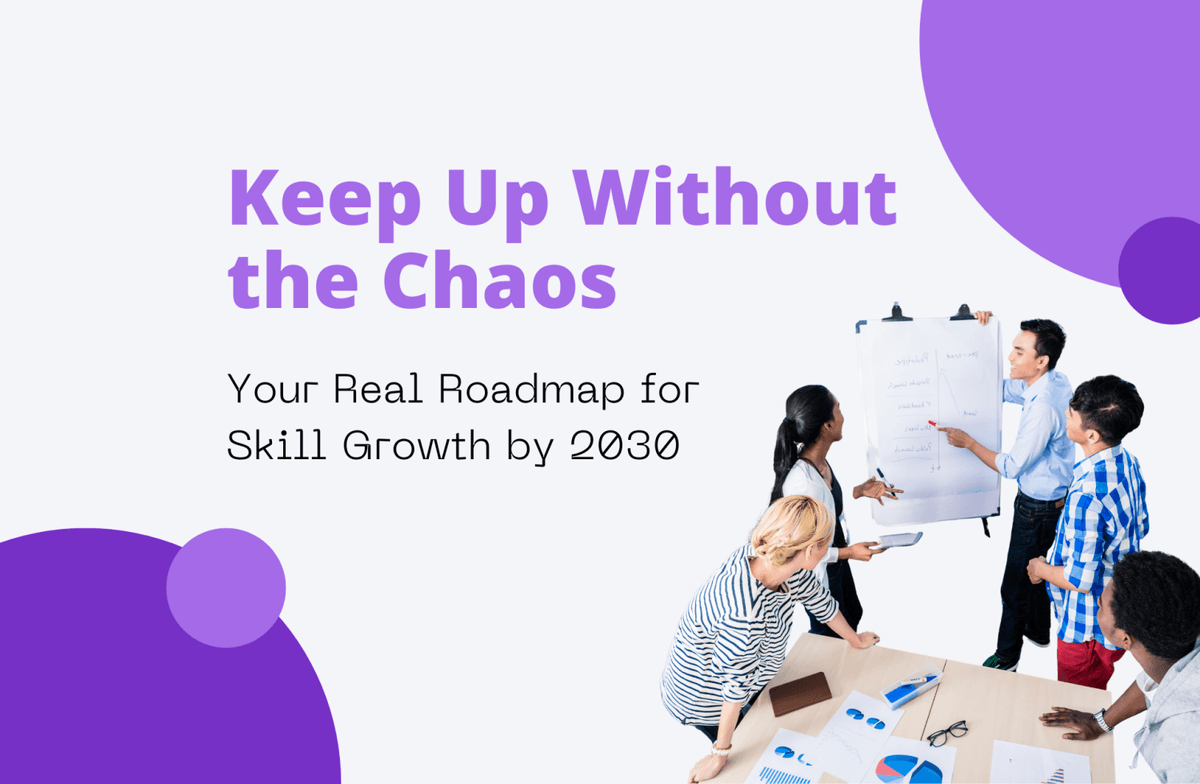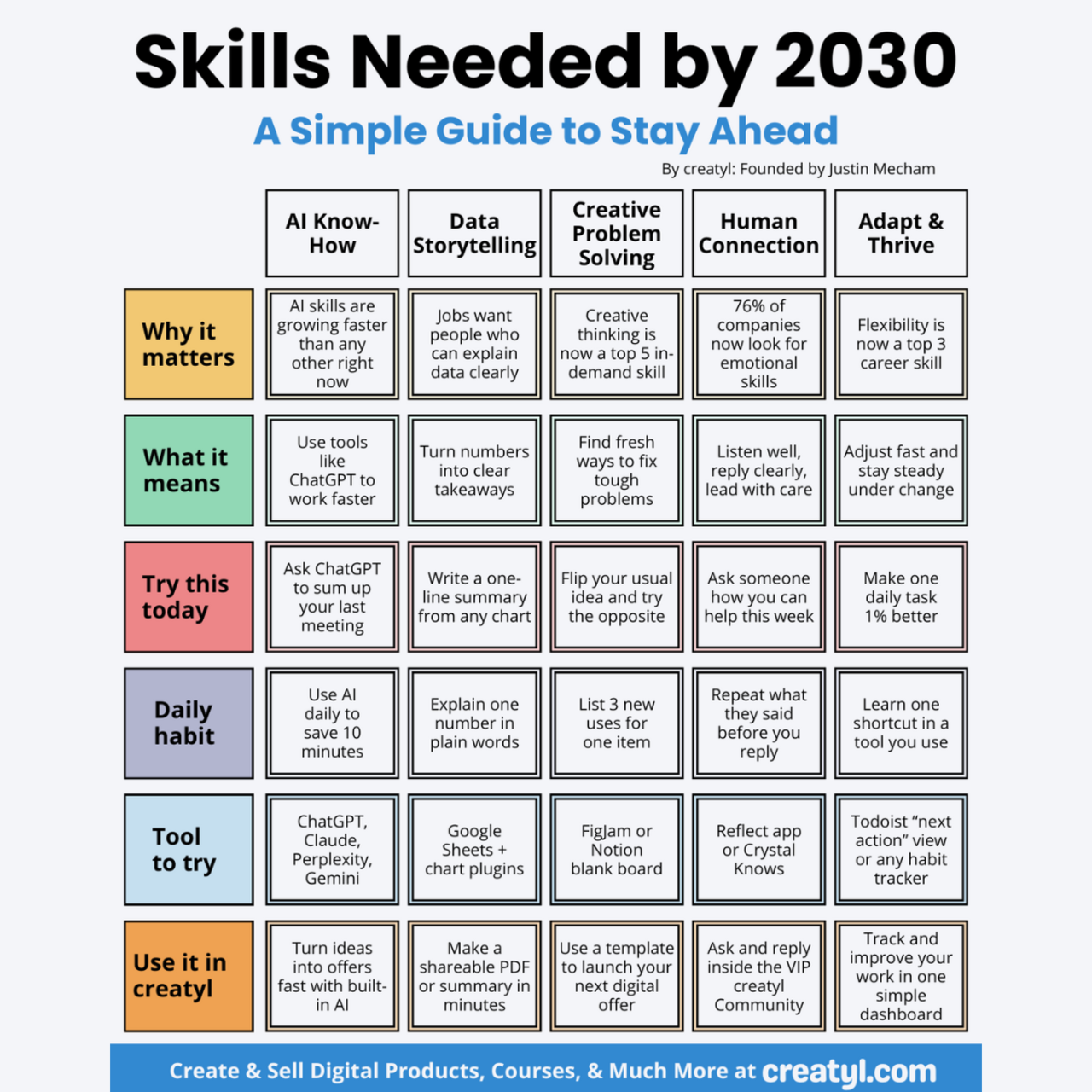Click Here to Download Today´s Infographic.
You’ve heard it before: “You’ve got to keep up.”
But most people never explain what that actually means.
Falling behind at work isn’t usually about being lazy.
More often, it’s because no one ever told you exactly what skills to work on—or how to build them into your day without piling on more hours.
The pace of change right now is unlike anything we’ve seen before.
AI is reshaping entire industries.
Job descriptions are shifting in real time. Skills you’ve relied on for years are getting automated, while new ones are quietly becoming non‑negotiable.
The good news? Staying ahead doesn’t have to mean doing everything.
It means getting smart about what you practice and how you practice it.
And this roadmap—five skills, five habits, one sheet—is designed to make that simple.
The 5 Skills That Will Actually Matter by 2030
These aren’t trendy buzzwords. They’re the skills companies are already hunting for—and the ones that will keep you relevant no matter what’s next.
AI Know‑How
AI isn’t “coming.” It’s here, it’s fast, and it’s not going anywhere. The people who know how to use tools like ChatGPT, Gemini, or Perplexity to speed up work, automate the boring stuff, and get better results will have an edge. This isn’t about replacing your role—it’s about making yourself more valuable inside it.
Data Storytelling
Anyone can share a spreadsheet. But not everyone can turn numbers into a clear, actionable story. If you can take raw data and make it meaningful, you can move decisions forward faster than someone who just drops a chart into a slide.
Creative Problem Solving
Old playbooks won’t always work. The ability to approach problems from fresh angles, test new ideas, and find better ways forward is becoming one of the most in‑demand skills out there.
Human Connection
Seventy‑six percent of companies now look for emotional skills as a top hiring priority. This is about listening well, speaking clearly, leading with care, and creating trust so people want to work with you—not just because they have to.
Adapt & Thrive
Change is the only guarantee. Whether it’s a new tool, a sudden shift in direction, or an unexpected challenge, being able to adjust quickly—and still deliver—will keep you relevant in any environment.
A Real Workplace Story: From Stuck to Solid
It’s one thing to list these skills. It’s another to see how they actually play out when things get messy.
I worked with a product team that was struggling hard to meet launch deadlines. Meetings were long but never seemed to land on clear decisions.
Data sat in reports without context.
Everyone waited for someone else to step in when problems came up.
Leadership was frustrated. The team was stressed and losing confidence.
They were stuck in reactive mode.
Issues surfaced too late to fix easily. Data wasn’t telling a story—it was just sitting there.
And when solutions came up, they were the same tired ones that had already failed.
Here’s what happened when we applied the five skills in small, daily actions:
- AI Know‑How – We had ChatGPT create one‑sentence summaries of every stand‑up meeting and post them in Slack. Suddenly, there were no “What did we decide?” follow‑ups. Everyone knew their next step before they left the room.
- Data Storytelling – Instead of dropping raw charts into updates, team members started adding a one‑line takeaway for their key metric. Example: “Conversion dropped 2% after the homepage redesign—likely due to slower load times.” That kind of clarity drove faster, better decisions.
- Creative Problem Solving – For recurring issues, the team flipped their default fix. If they usually threw more people at a problem, they tested automation first. That shift uncovered faster, cheaper solutions.
- Human Connection – Every Monday, each person asked a colleague: “What’s the most helpful way I can support you this week?” It was a small change, but it uncovered needs that would have been missed—and it cut down on tension.
- Adapt & Thrive – We introduced the “1% better” rule. Every day, improve one small thing—a clearer email, a faster dashboard, a new shortcut. Weeks later, those small changes had compounded into noticeably smoother workflows.
In six weeks, they went from missing deadlines to delivering on time.
Leadership stopped getting bad surprises. Meetings got shorter and more productive.
And the team’s reputation shifted from “scrambling” to “reliable.”
Why This Approach Works When Others Don’t
Most people try to “catch up” by cramming too much in at once or waiting until they’re forced to make a big change.
That’s exhausting—and it doesn’t stick.
The people who actually stay ahead pick one skill, practice it every day, and layer on the next one when the first feels natural.
No overwhelm. No all‑nighters. Just steady, compounding improvement that becomes part of how they work.
Tools That Actually Help
If you want to start building these skills now, these are worth your time:
- Book: Co‑Intelligence: Living and Working With AI by Ethan Mollick – Practical, clear, and all about making AI work with you, not against you.
- TED Talk: Soft Skills, Future of Work and Employability by Sonia Ben El Kahla – A reminder that adaptability, emotional clarity, and communication will always matter.
- AI Tools: ChatGPT, Gemini, Claude, Perplexity – Use them daily to summarize meetings, explain data, generate ideas, and speed up repetitive work.
Building the Future Before It Gets Here
The future doesn’t announce itself. It shows up quietly—through shifts in tools, in expectations, in what people notice and value.
You don’t get ready for it by chasing every trend or reacting to every change.
You get ready by deciding what matters, starting small, and repeating it until it becomes second nature.
One small action every day builds momentum. That momentum builds trust.
And trust is what makes people listen when you speak, follow when you lead, and believe you can handle what’s next.
The people who stay ahead aren’t the ones doing the most.
They’re the ones doing the right things—consistently, intentionally, and without waiting for permission.
When you work like that, you’re not just “keeping up.”
You’re quietly, steadily shaping where you’ll be when the rest of the world finally notices the change.
Download the Infographic
Want the roadmap in a quick, ready‑to‑use format you can reference every day?
Download the Skills Needed by 2030 infographic as a PDF and keep it visible in your workspace.
Click here to download your PDF





